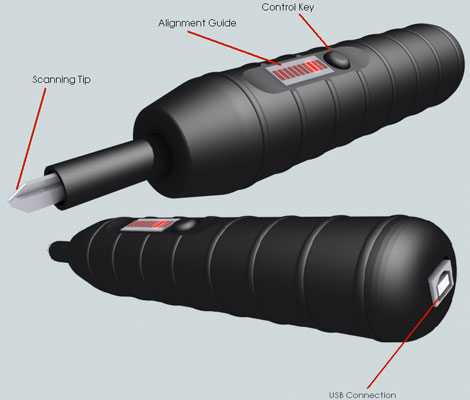
For locksmiths, making a replacement car key without its identifying code can be a grueling procedure. Steve Randall should know—he spent a summer during college working for his father's locksmithing company, watching experts struggle with the process. Lacking the identification codes, called bittings, that tell them which patterns to cut into blanks, locksmiths must rely on trial and error to make a perfect fit. Inspired, Randall and a friend, Ted Schwarzkopf, recently unveiled a solution: the Electronic Key Impressioner.
The Impressioner consists of a sensor that goes into the lock and sends information back to a computer via USB about the location of the lock's tumblers—a corresponding computer program comes up with the code, depending on the make of car you've entered beforehand. Once you know the code, a key-cutting machine can use it to carve up a key.
Some keys are more complicated than this system can anticipate. For example, many car keys have transponders in them, so even if a newly cut key can open a car, it won't be able to start it. But tools exist already for locksmiths to crack transponder codes—and there are plenty of cars out there that still use simple, old-fashioned key technology.
It doesn't take a huge leap of logic to note that what could be a perfect invention for locksmiths could easily turn into a payday for thieves—and a nightmare for car companies. There are plenty of "for locksmiths only" tools out there that make breaking into cars easy (for people who locked their keys in the car, for example). But the ability to fabricate the perfect key without getting a code from the manufacturer could make it easier for thieves to resell stolen cars. If you're stealing a car these days, there's a good chance you're not bothering to actually pick the locks, but if you are, your job is about to get a little easier. Right now it only works on Fords with simple metal keys (like, say, a 1967 Shelby GT500), but the hope is to expand the device to support other manufacturers and, possibly, electronic keys in the future. It will be available to locksmiths and authorized security professionals in 2010. Sorry, Nick, you'll have to find another way to get into Eleanor.
So Randall and Schwarzkopf need to plan for problems on two fronts—on the one hand they need to make sure their device stays in the right hands, on the other, they need to make sure it stays relevant. After all, once such a surefire way to replicate car keys exists, how long will it be until companies change their lock technology completely?
As far as security is concerned, the device's first line of defense will be the same as all professional lock-picking devices—it will only be for sale to state-licensed locksmiths. But if that doesn't work out, the company will be able to shut down rogue systems. When the software starts up, it will have to connect to a database full of updated key codes—that system will have the authority to brick the device remotely.